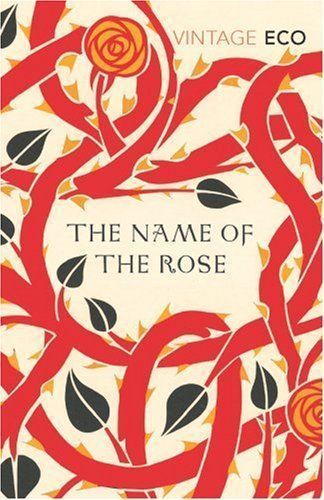My mum had been
constantly recommending this book to me
until I finally physically picked it up and started reading it. Since she
doesn’t recommend books to me very often, I felt like I had to read this one
because it must be good if she liked it so much. And it was, it was just very difficult to get into at
first. From the blurb, I originally thought that the book was going to be a
detective story, with murders and clues and puzzles. It was a detective story,
but it was also so much more than that.
Umberto Eco's The Name of the Rose, is set in an Abbey in the Middle Ages and goes to great length to describe the religious history at the time. That was, by far, the more interesting aspect of this novel, even more interesting than the detective story aspects. I found the history fascinating. It was so interesting to read about the different aspects of Christianity and the different types of monastic orders which exist. I also learnt about how easy it is to be branded a heretic (I mean, being burned at the stake for saying something mild about Christ is rather scary to think about) and that religious inquisitors (the people who would put suspected heretics on trial and decide punishments) had absolute power.
Umberto Eco's The Name of the Rose, is set in an Abbey in the Middle Ages and goes to great length to describe the religious history at the time. That was, by far, the more interesting aspect of this novel, even more interesting than the detective story aspects. I found the history fascinating. It was so interesting to read about the different aspects of Christianity and the different types of monastic orders which exist. I also learnt about how easy it is to be branded a heretic (I mean, being burned at the stake for saying something mild about Christ is rather scary to think about) and that religious inquisitors (the people who would put suspected heretics on trial and decide punishments) had absolute power.
The main character,
William of Baskerville, is amazing. He values logic and common sense and uses
these to solve the crimes occurring at the Abbey (I’m sure Eco used Baskerville
as a nod to Sherlock Holmes). Even though he is deeply
religious (he is a monk after all) he shows himself to be a free thinker from
the things he says and how he behaves. In one chapter, some of the monks are
talking about how women are evil and in league with the devil, which was a
little offensive if I’m honest, me being a woman and all. William, however,
argues that if that was true, God would not have given women the ability to
give birth to man, so they can’t be all bad (thanks Wil!).
The story is told in a
memoir, first person format by Adso, who was a novice at the time of the
murders. He, as well as the reader, learns a lot from William, like how important it is to think about things carefully, and that it's ok to make mistakes as long as you can improve yourself by them. The writing style was interesting, but Adso spends a lot of time describing things and listing things. Usually I love descriptions, they help me to get a much better picture of what everything looks like in my head, but Adso just took it to a whole new level and sometimes the narrative was a little tedious. However, I have to say, that in general, I really enjoyed hearing about the events (so to speak) from Adso's point of view. He is so innocent and he struggles with aspects of his religion as he tries to discover what he wants from life. I liked this because I felt like I was also able to go with Adso on this personal journey, which was nice.
The murders themselves, whilst perhaps not the most prominent aspect of the novel, are exciting and dangerous. The murderer is not revealed till the last possible moment, and trust me, you'll never be able to guess who it is or why they did it. I think Eco is a master mystery writer in this sense, he keeps up the suspense till the last possible moment. There is this kind of audible reaction, like "ahh, that's so clever!" and "I didn't see that coming!", once the mystery has been solved.
The murders themselves, whilst perhaps not the most prominent aspect of the novel, are exciting and dangerous. The murderer is not revealed till the last possible moment, and trust me, you'll never be able to guess who it is or why they did it. I think Eco is a master mystery writer in this sense, he keeps up the suspense till the last possible moment. There is this kind of audible reaction, like "ahh, that's so clever!" and "I didn't see that coming!", once the mystery has been solved.
Which translates to: "I searched for quiet everywhere, and found it nowhere except in a corner with a book." And if that doesn't ring true to all you bibliophiles out there, then I don't know what will.




.jpg)